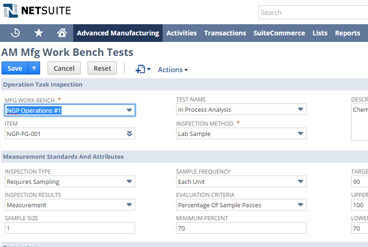Product Features
For Manufacturing
Home / Quality Management
Menu
Quality Management
Define inspection plans, pass / fail criteria, collect results and monitor in real-time
Designing and manufacturing a product of high quality doesn’t happen by accident, it requires a companywide commitment. NetSuite’s Quality Management solution has been designed to help you deliver the highest quality in your products with minimal overhead.
Key Benefits
- Improved product quality.
- Define and maintain inspection plans.
- Collect in-process and incoming inspection results.
- Compare to pass / fail criteria.
- Integrated non-conformance reporting.
- Reduced cost of quality.





























